- Home
- H A CULLEY
Uhtred the Bold
Uhtred the Bold Read online
UHTRED THE BOLD
By
H A Culley
Book one about the Earls of Northumbria
Published by
Orchard House Publishing
First Kindle Edition 2019
Text copyright © 2019 H A Culley
The author asserts the moral right under the Copyright, Designs and Patents Act 1988 to be identified as the author of this work.
This novel is a work of fiction. The names, characters and events portrayed in it, which sticking as closely to the recorded history of the time and featuring a number of historical figures, are largely the product of the author’s imagination.
It is sold subject to the condition that it shall not by way of trade or otherwise be lent, resold, hired out or otherwise circulated without the author or the publisher’s prior consent, electronically or in any form of binding or cover other than the form in which it is published and without this condition being imposed on any subsequent purchaser or owner.
Replication or distribution of any part is strictly prohibited without the written permission of the copyright holder.
All Rights Reserved
Cover Image: (c) Shutterstock
TABLE OF CONTENTS
Author’s Note
List of Characters
Chapter One – Invasion
Chapter Two – The Muster at Falkirk
Chapter Three – The Battle of Penicuik
Chapter Four – Saint Cuthbert’s Bones
Chapter Five – Thane of Duns
Chapter Six – Return to Durham
Chapter Seven – Raiders
Chapter Eight – Lothian Under Threat
Chapter Nine – The Treaty of Falkirk
Chapter Ten – Saint Brice’s Day Massacre
Chapter Eleven - The Battle of Monzievaird
Chapter Twelve – Malcolm’s Invasion
Chapter Thirteen – The Battle of Durham
Chapter Fourteen - Thurbrand
Chapter Fifteen – Eadwulf
Chapter Sixteen – Sweyn Forkbeard
Chapter Seventeen – The Return of Æthelred
Chapter Eighteen – Cnut’s Invasion
Chapter Nineteen – The Conquest of England
Chapter Twenty – Treachery
Epilogue
Historical Note
Author’s Note
This book is set in a period when Northumbria encompassed a large part of Northern England – a very much larger area that present day Northumberland. In addition to that county Bernicia covered the Borders Region and Lothian in Scotland and County Durham, Tyne and Wear and Cleveland in England. Deira, the southern part of Northumbria, corresponded roughly to Yorkshire.
In the last book of the series ‘The Kings of Northumbria’ I said in the historical note that Uhtred the Bold died at the Battle of Carham and, indeed, several sources reflect this account of his death. However, further research on my part leads me to believe that Uhtred was killed some months before the battle by Thurbrand the Hold on the orders of King Cnut (or Canute). As a blood feud evidently followed his murder this makes it the more likely of the two accounts of Uhtred’s death. Therefore this is the version I have followed in this novel.
One source states that Uhtred was summoned to meet Cnut in the hall of a local thane at a place called Wiheal, though it is impossible to identify the pace with any certainty. He and his forty warriors were disarmed and divested of their armour before entering the hall. Once inside and unable to see clearly in the dark interior after the brightness outside, he and his men were set upon by Thurbrand the Hold in front of Cnut and slaughtered to a man.
Why Cnut would have selected an obscure hall, if he did, is unclear. I am also puzzled by his presence. Uhtred was influential and powerful; surely he would have wanted to distance himself from his murder. I have preferred to have Uhtred go down fighting after being ambushed en route to Gainsborough, Cnut’s interim base. It also allows me to have two of his men escape to tell the tale and identify the killers.
In past books about the Anglo-Saxon period I have used the ancient names for places, where known, to add authenticity to the story. However several reviewers have said that this is confusing, especially when the reader has also had to cope with the unfamiliar names of the characters. I have therefore used the modern names for places with two notable exceptions. I have retained the Anglo-Saxon name for Bambrough – Bebbanburg as that will be very familiar to readers who like this period, and I have used the old name for Yorkshire - Deira. As this would have been divided up into a number of administrative shires at this time to call it Yorkshire would be confusing.
I have also used Aldred instead of Ealdred for Uhtred’s eldest son. This is to save confusion when so many characters have names beginning Ea.
Since the demise of the Kingdom of Northumbria it had been split in two, the Danes ruling the old Saxon Kingdom of Diera, centred on York, in the south and the hereditary lords of Bebbanberg governing Bernicia (including Lothian) in the north.
At the time that this novel begins Northumbria, or what remained of the ancient northern kingdom, was divided into two; Deira in the south centred on York; and Bernicia between the River Tees and the Firth of Forth. Although absorbed by Bernicia in the seventh century, the northern region of Bernicia between the River Tweed and the Firth of Forth was still known as Lothian.
The inhabitants of Lothian were descended from the Goddodin, a tribe of Britons who had more in common with the Welsh and the people of Strathclyde than they did with their conquerors – the Angles from Bernicia. Over the centuries the three peoples of what had become Alba – the Picts, the Britons of Strathclyde and the Scots of Dalraida – had united. However, to save confusion I have used the modern name of Scotland and used the name Scots for the inhabitants. For some time before the start of this novel the Scots had sought to make Lothian part of their kingdom.
Although the first King of the English, Æthelstan, had subjugated the Danes of Yorvik – the Danish name for York – and brought them under his rule, they had retained their Viking identity and their relationship with a king who lived in Wessex was a fragile one. Since Æthelstan’s time the differences between the Danes and the Angles – the inhabitants of Deira before the time of the Danelaw – had been somewhat eroded by the passing of the years, inter-marriage and conversion to Christianity; nevertheless Deira stood out as a largely Danish ghetto in the midst of an Anglo-Saxon England. Although people of Danish descent lived in other parts of England, notably in northern Mercia, they were very much in the minority.
Thus in the late tenth century Bernicia was surrounded by potential enemies: the Scots to the North, the Danes to the South and the Scandinavian raiders from across the North Sea, the Northern Isles and from Ireland.
List of Characters
In order of appearance, historical characters are shown in bold:
Waltheof - Earl of Bernicia, Uhtred’s father
Æthelred – King of England
Uhtred – Waltheof’s elder son, later nicknamed the Bold (the narrator of the story)
Ælfhelm – Earl of Deira
Kenric – One of Uhtred’s companions, later Thane of Carham
Borg – A Norse boy, body servant to Uhtred, later one of his household warriors
Ulfric – One of Waltheof’s household warriors, later Thane of Norham
Olaf Tryggvason – A Norse leader, later King of Norway
Kenneth III - King of Scots
Ælfleda – Waltheof’s wife and Uhtred’s mother
Eadwulf – Uhtred’s brother, later nicknamed Cudel (cuttlefish – an invertebrate) presumably because he lacked backbone
Osmond - Ealdorman of Edinburgh, one of the three shires of Lothian
Drest – Malcolm’s cousin and Kenneth’s champion
Leland – Captain of Waltheof’s household warriors, later Uhred’s captain
Aldhun – Bishop of Lindisfarne, later Bishop of Durham
Ecgfrida – Aldhun’s daughter, later Uhtred’s first wife
Cædmon – Uhtred’s body servant after Borg
Aldred – Uhtred’s eldest son
Leofwine - Ealdorman of Durham
Ealdwulf – Archbishop of York prior to 1002
Sicga – Thane of Ayton
Hacca – Osmond’s son, later Ealdorman of Edinburgh
Angus – Malcolm’s illegitimate son, sometime Ealdorman of Edinburgh
Owain ap Dyfnwal – Nicknamed the Bald; King of Strathclyde
Gosric - Ealdorman of Selkirkshire in Lothian
Iuwine – Ealdorman of Berwickshire in Lothian
Swefred – Thane of Dunbar
Giric – Kenneth’s son, later co-king with his father
Sweyn Forkbeard - King of Denmark, later King of England
Eric Håkonsson – Jarl of Lade and ruler of Norway under Sweyn Forkbeard, later Earl of Deira
Sigurd the Stout – The Norse Jarl of Orkney who also ruled over the Shetland Isles, much of the Hebrides as well as Caithness and Sutherland on the Scottish mainland
Wulfstan Lupus – Archbishop of York from 1002 and Bishop of Worcester
Uuen – Uhtred’s body servant after Cædmon’s death
Edmund Ironside – Son of King Æthelred, later King of England
Horsa – Captain of Bebbanburg fortress under Uhtred
Styr – Wealthy Danish noble living in Deira
Sige – Styr’s daughter; Uhtred’s second wife
Thurbrand - Uhtred’s killer. In this novel I have portrayed him as Styr’s son
Osric – Captain of Uhtred’s household warriors after Leland
Eadulf – Uhtred and Sige’s son
Thorkell the Tall – Danish jarl, later Earl of East Anglia
Cnut – Sweyn Forkbeard’s elder son, later King of England, Denmark and Norway
Eirik – A Norse boy, body servant to Uhtred’s sons
Ælfgifu – Uhtred’s third wife. Daughter of King Æthelred and Emma of Normandy
Ealdgyth – Uhtred’s daughter, later married Maldred of Dunbar, brother of King Duncan of Scotland
Wictred – One of Uhred’s housecarls
Ælfflæd - Uhtred’s posthumous daughter, later wife of Siward, Earl of Northumbria
Chapter One – Invasion
June 985
‘Lord, the Danes are raiding north of the Tyne,’ the breathless messenger panted as soon as he’d been shown into the hall at Bebbanburg.
Waltheof, Earl of Bernicia, looked up startled from the table where he’d been discussing likely crop yields and taxation with his steward. Viking raids had all but died out during the rule of King Edgar but the last few decades had been more turbulent ones for England.
The present king, Æthelred, nicknamed the ill-advised, was widely suspected of murdering his half-brother, King Edward the Martyr. That, coupled with his weak and corrupt rule, had brought the kingdom close to breaking asunder. The Norse and the Danes had taken full advantage of the situation; not just the raiders living in the Viking homelands, but also some of the Danes living in Deira.
‘Are these raiders from the south or from overseas?’ Waltheof asked, not so much because he wanted to know, but to buy himself some time to think.
‘The villagers which have fled into the hills say that they arrived in fifty longships, lord.’
Waltheof hoped that fifty was a wild exaggeration. Each ship would be carrying between thirty and sixty men and between two and three thousand warriors would be a vast host; nearly as many as the original Great Heathen Army which had devastated the country over a century ago. Now the Danes had settled and had been incorporated into Anglo-Saxon England, but bands of young warriors brought up on the sagas of Ivor the Boneless and the other sons of Ragnar Lodbrok still occasionally came raiding. However, these tended to be small bands of less than a hundred. This sounded much more serious.
‘Will you call out the fyrd, father?’ I asked from the corner where I had been playing dice with two of my friends.
‘Even if all the freemen and trained warriors from all over Bernicia answered my call to muster, we would be lucky to raise more than two thousand, Uhtred,’ my father replied. ‘No, we need help from Deira to defeat this army.’
Deira was the name given to the kingdom based on York which had originally been settled by Angles, the same people who had settled Bernicia. Saint Oswald had combined the two into the Kingdom of Northumbria over three hundred years ago but it had been split apart again when the Danes came and conquered most of Northern England. Only the land between the River Tyne and the Firth of Forth had escaped relatively unscathed. This was Bernicia, which my ancestors had fought to keep as an independent realm.
When the old Anglo-Saxon kingdoms had been united under the rule of King Edgar’s grandfather, Æthelstan, he had made my great-grandfather Earl of Bernicia and the family had continued to govern the far north east of England ever since. Now it seemed that our rule was about to be challenged.
Older and wiser heads might worry about the future but I was fourteen and newly classed as a warrior. I saw this as a change to win fame and glory and didn’t think what the implications of such a large army of invaders might be. However, my hunger for renown would have to remain unquenched for a while.
‘Uhtred, take half a dozen men and ride to York. Implore Earl Ælfhelm to raise his fyrd and make haste to come to our aid. Perhaps we can trap this Viking host between us.’
‘Yes, father.’
Waltheof frowned and I realised that I should have called him lord. He was entrusting me with this task as one of his warriors, not as his son.
I took my two dice-playing friends, Feran and Kenric, both sons of thanes, and four of the household warriors with me. It was late in the day but the weather was fair and, being mid-June, the days were long. We rode into Alnwick at dusk that day and spent the night in the hall of the local ealdorman. We left just after first light, heading south west to Hexham where I planned to stay the night at the abbey. I intended to cross the Tyne there and then make our way to Durham and thence down the old Roman road to York.
That way I expected to avoid the Viking army, who I assumed would still be in the vicinity of Jarrow. I was wrong as it turned out.
We were lucky with the weather. The first day had been sunny and, although dark clouds scudded in from the west on the next day, no rain fell. However, I wasn’t so optimistic as to believe that we would complete our journey in the dry. It might be the middle of summer but it had been a mainly wet one so far and everyone was concerned about a poor harvest.
Being overcast, the day was muggy and I sweated in my byrnie, a coat of chain mail which protected my torso and upper arms. Under that I wore a leather jerkin and a linen under tunic. I was tempted to take my mail off, but that would have been foolish in the circumstances. The only concession to comfort I allowed was to sling our shields across our backs and ride bareheaded, hanging our helmets from our saddles and wearing our leather coifs pushed back. Not only was that more comfortable but it allowed us to hear better, something that proved invaluable.
I became aware of the proximity of Vikings when I heard voices as we rode along a track through the woods on the north bank of the River Tyne. Whoever was chatting away wasn’t trying to hide their presence and we had time to urge our horses into the undergrowth beside the track before they came into sight.
‘They’re not Danes,’ Ulfric, one of my father’s household warriors, whispered in my ear as we cautiously watched them emerge around a bend from behind the cover of a hawthorn bush and the overhanding branches of an oak tree.
Ulfric’s father had married a Dane
and he’d been brought up bilingual.
‘It’s similar though – perhaps Norse?’
I wondered what on earth Norsemen were doing in Northumbria. They lived in Ireland and in the Orkneys. Oh, there had been some who had settled in York and the surrounding province of Deira in the time of the Danelaw, but the latter had now been absorbed into the Danish population and there weren’t enough living in the Orkneys to put together such a large army as had been reported.
They could be Irish Norsemen, of course. There were enough of them in Dublin and the surrounding countryside, but that didn’t make sense either. If they had landed in force it would have been in the west and they would be making their way east, not the other way around. I shook my head to dispel such speculation and concentrated on the immediate situation.
There were ten of them, presumably a scouting party returning from Hexham to report to the main body. Scouts normally ranged up to ten miles ahead of the army so the implication was that the latter were a lot closer than I had assumed. They were riding two abreast and paying scant attention to their surroundings. Just as I thought that they would pass our hiding place without noticing us, Feran’s mare whinnied as she caught the smell of a stallion amongst the Norse horses.
The Norse and the Danes used horses to ride from place to place but they weren’t trained to fight on horseback; neither were most Saxons, but one of my ancestors had decided that using cavalry to attack the enemy had its advantages and ever since then the permanent warriors of Bebbanburg had been taught to be ride and fight mounted.
We had pulled up our coifs, tied our helmets on our heads and brought our shields around to protect our left side as a matter of course as soon as we’d hidden amongst the trees. Now I drew my sword whilst the others did likewise or else took a firm grip on the battle-axes that hung from their saddles.
I didn’t need to give the order to charge. As soon as Feran’s mare alerted the Norse to our presence we erupted out of the undergrowth whilst the enemy were still looking startled. I picked on the warrior nearest to me, a giant of a man with a bushy brown beard into which he’d tied a selection of finger bones and wearing a byrnie and a helmet with a fixed visor with small eyeholes.

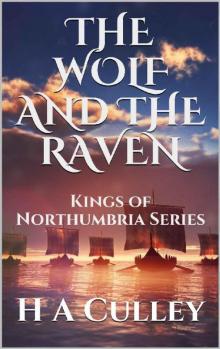 The Wolf and the Raven
The Wolf and the Raven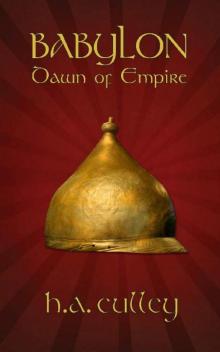 Dawn of Empire
Dawn of Empire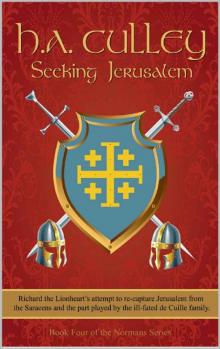 Seeking Jerusalem
Seeking Jerusalem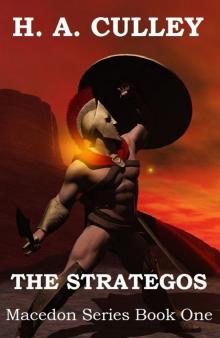 The Strategos
The Strategos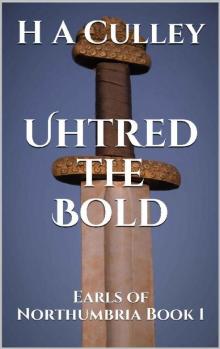 Uhtred the Bold
Uhtred the Bold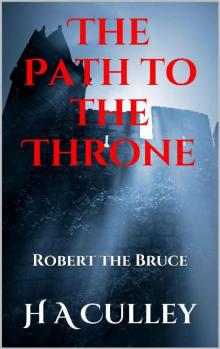 The Path to the Throne
The Path to the Throne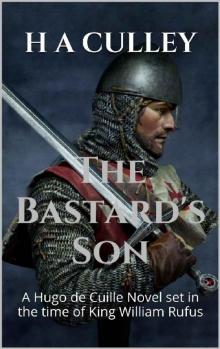 The Bastard's Son
The Bastard's Son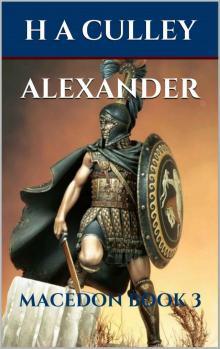 Alexander
Alexander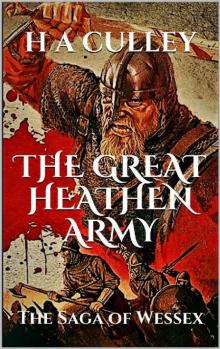 The Great Heathen Army
The Great Heathen Army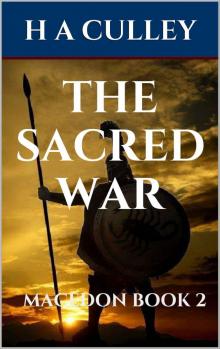 The Sacred War
The Sacred War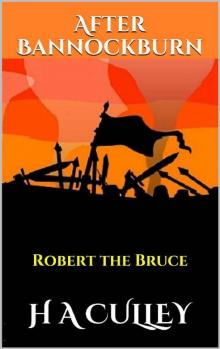 After Bannockburn
After Bannockburn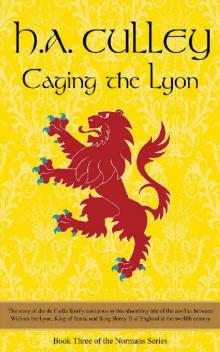 Caging the Lyon
Caging the Lyon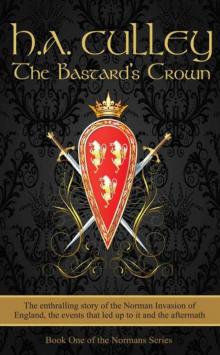 The Bastard's Crown
The Bastard's Crown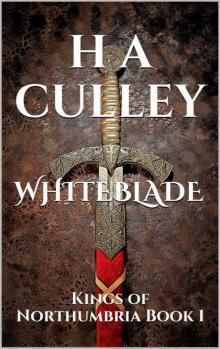 WHITEBLADE
WHITEBLADE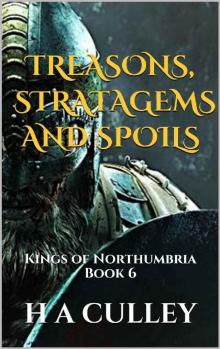 TREASONS, STRATAGEMS AND SPOILS: Kings of Northumbria Book 6
TREASONS, STRATAGEMS AND SPOILS: Kings of Northumbria Book 6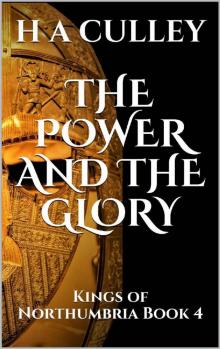 THE POWER AND THE GLORY: Kings of Northumbria Book 4
THE POWER AND THE GLORY: Kings of Northumbria Book 4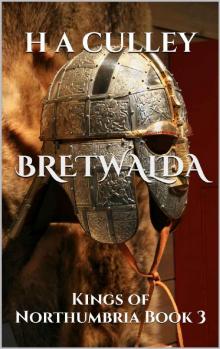 BRETWALDA: Kings of Northumbria Book 3
BRETWALDA: Kings of Northumbria Book 3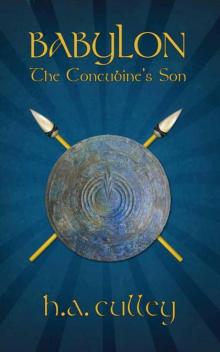 The Concubine's Son
The Concubine's Son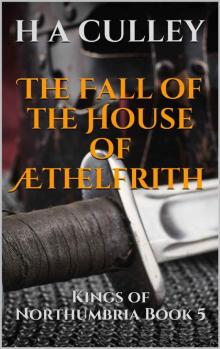 The Fall of the House of Æthelfrith: Kings of Northumbria Book 5
The Fall of the House of Æthelfrith: Kings of Northumbria Book 5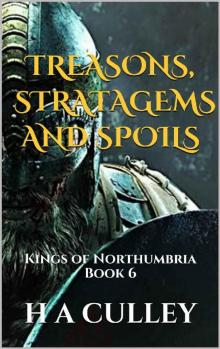 TREASONS, STRATAGEMS AND SPOILS
TREASONS, STRATAGEMS AND SPOILS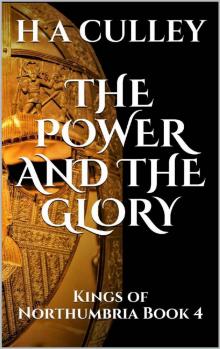 THE POWER AND THE GLORY
THE POWER AND THE GLORY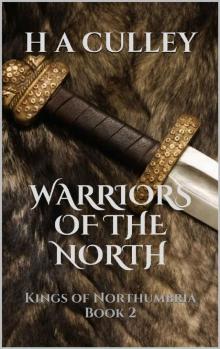 WARRIORS OF THE NORTH
WARRIORS OF THE NORTH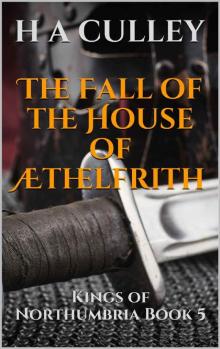 The Fall of the House of Æthelfrith
The Fall of the House of Æthelfrith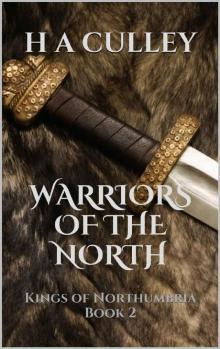 WARRIORS OF THE NORTH: Kings of Northumbria Book 2
WARRIORS OF THE NORTH: Kings of Northumbria Book 2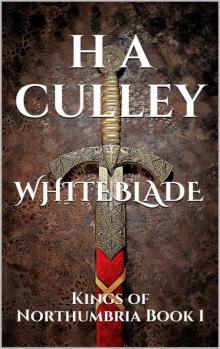 WHITEBLADE: Kings of Northumbria Book 1
WHITEBLADE: Kings of Northumbria Book 1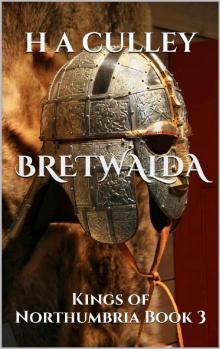 BRETWALDA
BRETWALDA